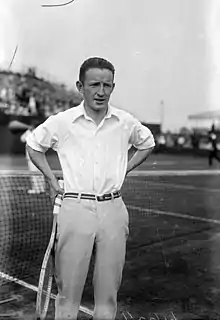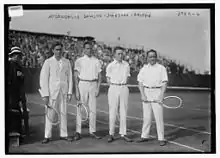Bill Johnston (tennis)
William Marquitz "Little Bill" Johnston (November 2, 1894 – May 1, 1946) was a former World No. 1 American tennis champion.
 Johnston in 1916 in his match against Richard "Dick" Norris Williams II | |
| Full name | William Marquitz Johnston |
|---|---|
| Country (sports) | |
| Born | November 2, 1894 San Francisco, California, U.S. |
| Died | May 1, 1946 (aged 51) San Francisco, California, U.S. |
| Height | 1.73 m (5 ft 8 in) |
| Turned pro | 1913 (amateur tour) |
| Retired | 1928 |
| Plays | Right-handed (1-handed backhand) |
| Int. Tennis HoF | 1958 (member page) |
| Singles | |
| Career record | 350–51 (87.3%) [1] |
| Career titles | 42 [1] |
| Highest ranking | No. 1 (1919, A. Wallis Myers)[2] |
| Grand Slam Singles results | |
| Wimbledon | W (1923) |
| US Open | W (1915, 1919) |
| Other tournaments | |
| WHCC | W (1923) |
| Doubles | |
| Grand Slam Doubles results | |
| Wimbledon | SF (1921) |
| US Open | W (1915, 1916, 1920) |
| Mixed doubles | |
| Grand Slam Mixed Doubles results | |
| Wimbledon | 2R (1923) |
| US Open | W (1921) |
| Team competitions | |
| Davis Cup | W (1920, 1921, 1922, 1923, 1924, 1925, 1926) |

Biography
Bill Johnston was born November 2, 1894, in San Francisco, the son of Robert Johnston, an electrical plant mechanic and Margaret Burns, of Irish origin. Johnston started to play tennis in early 1906, aged 11, on the public asphalt courts in Golden Gate Park. After the 1906 San Francisco earthquake, the schools were closed, and he spent much of his spare time practicing on the tennis courts. He achieved his first tournament victory at the 1910 Bay Counties junior singles competition.[3]
In 1916, Johnston won the Cincinnati Open (now Cincinnati Masters) after Clarence Griffin defaulted in the challenge round. Johnston won the Longwood Challenge Cup, played on the Longwood Courts at Chestnut Hill, MA in 1913, 1916, 1919, 1920 and 1921.[4]
During World War I, Johnston served in the U.S. Navy.[5]
Johnston was the co-World No. 1 player in 1919 and in 1922 respectively along with Gerald Patterson and Bill Tilden. He won the US Championships in 1915 and 1919 as well as the World Hard Court Championships (clay) and Wimbledon in 1923.[6]
Until "Big Bill" Tilden began to defeat him regularly in 1920, Johnston had been the best American player for a number of years and was ranked No. 1 by the United States Lawn Tennis Association in 1915 and 1919.[7] In July 1919 Johnston had defeated Tilden in the final of the U.S. Clay Court Championships.[8] A month later, Johnston had beaten Tilden in three straight sets in the final of the 1919 US Championships, then Tilden overtook him in 1920. Johnston remained competitive with Tilden for the next seven or eight years, but was never able to beat Tilden in an important match again. For instance, in 1922 Johnston defeated Tilden three times out of four occasions but Tilden beat Johnston in the final of the U.S. Championships in five sets.[9] In 1923, despite Johnston winning both the World Hard Court Championships and Wimbledon, he again failed to beat Tilden at the US Championships, losing in three one-sided sets. Johnston again threatened to get closer to beating Tilden on the big stage in following years, but memorably lost the 1925 US Championships final in five sets to Tilden. Johnston was runner-up a record six times in the US Championships, This is still a record today. Together Johnston and Tilden won seven consecutive Davis Cup trophies, from 1920 to 1926, a record that still stands.[10] In September 1927, Johnston announced his retirement after the U.S. Davis Cup loss to the French team consisting of the 'Four Musketeers' and confirmed his decision in mid-1928.[11] He turned down an offer to become professional.[12]
Johnston was renowned for the power and deadliness of his forehand drive, which he hit shoulder-high with a Western grip, and which was considered the best forehand of his time.[5][13][14]
After his tennis career, Johnston was active in the brokerage industry. He died of tuberculosis on May 1, 1946 at the age of 51.[15]
Legacy
Bill Johnston was inducted into the International Tennis Hall of Fame in 1958.
Grand Slam finals
Singles: 9 (3 titles, 6 runners-up)
| Result | Year | Championship | Surface | Opponent | Score |
|---|---|---|---|---|---|
| Win | 1915 | U.S. Championships | Grass | 1–6, 6–0, 7–5, 10–8 | |
| Loss | 1916 | U.S. Championships | Grass | 6–4, 4–6, 6–0, 2–6, 4–6 | |
| Win | 1919 | U.S. Championships | Grass | 6–4, 6–4, 6–3 | |
| Loss | 1920 | U.S. Championships | Grass | 1–6, 6–1, 5–7, 7–5, 3–6 | |
| Loss | 1922 | U.S. Championships | Grass | 6–4, 6–3, 2–6, 3–6, 4–6 | |
| Win | 1923 | Wimbledon | Grass | 6–0, 6–3, 6–1 | |
| Loss | 1923 | U.S. Championships | Grass | 4–6, 1–6, 4–6 | |
| Loss | 1924 | U.S. Championships | Grass | 1–6, 7–9, 2–6 | |
| Loss | 1925 | U.S. Championships | Grass | 6–4, 9–11, 3–6, 6–4, 3–6 |
Doubles (3 titles)
| Result | Year | Championship | Surface | Partner | Opponents | Score |
|---|---|---|---|---|---|---|
| Win | 1915 | U.S. Championships | Grass | 2–6, 6–3, 6–4, 3–6, 6–3 | ||
| Win | 1916 | U.S. Championships | Grass | 6–4, 6–3, 5–7, 6–3 | ||
| Win | 1920 | U.S. Championships | Grass | 6–2, 6–2, 6–3 |
Mixed doubles (1 title)
| Result | Year | Championship | Surface | Partner | Opponents | Score |
|---|---|---|---|---|---|---|
| Win | 1921 | U.S. Championships | Grass | 3–6, 6–4, 6–3 |
Performance timeline
| W | F | SF | QF | #R | RR | Q# | A | NH |
Events with a challenge round: (WC) won; (CR) lost the challenge round; (FA) all comers' finalist
(OF) only for French players
| 1913 | 1914 | 1915 | 1916 | 1917 | 1918 | 1919 | 1920 | 1921 | 1922 | 1923 | 1924 | 1925 | 1926 | 1927 | SR | W–L | Win % | |
|---|---|---|---|---|---|---|---|---|---|---|---|---|---|---|---|---|---|---|
| Grand Slam tournaments | 3 / 15 | 67–12 | 84.8 | |||||||||||||||
| French | OF | not held | OF | A | A | A | 0 / 0 | 0–0 | – | |||||||||
| Wimbledon | A | A | not held | A | 2R | A | A | W | A | A | A | A | 1 / 2 | 8–1 | 88.9 | |||
| U.S. | 3R | 2R | W | F | A | A | W | F | 4R | F | F | F | F | QF | SF | 2 / 13 | 59–11 | 84.3 |
| Australian | A | A | A | not held | A | A | A | A | A | A | A | A | A | 0 / 0 | 0–0 | – | ||
| Win–Loss | 2–1 | 1–1 | 7–0 | 6–1 | 0–0 | 0–0 | 7–0 | 7–2 | 3–1 | 5–1 | 12–1 | 6–1 | 5–1 | 2–1 | 4–1 | |||
References
- "Bill Johnston: Career match record". thetennisbase.com. Tennis Base. Retrieved November 3, 2017.
- United States Lawn Tennis Association (1972). Official Encyclopedia of Tennis (First Edition), p. 422.
- Ohnsorg, Roger W. Robert Lindley Murray: The Reluctant U.S. Tennis Champion; includes "The First Forty Years of American Tennis". Victoria, BC: Trafford On Demand Pub. pp. 39, 40, 295–298. ISBN 9781426945144.
- Irving C. Wright, ed. (1921). 1921 Wright & Ditson Official Lawn Tennis Guide. Wright & Ditson. pp. 39, 40.
- Grasso, John (2011). Historical Dictionary of Tennis. Lanham, Md.: Scarecrow Press. p. 153. ISBN 978-0810872370.
- "Johnston is Again Supreme in Tennis" (PDF). The New York Times. December 21, 1919.
- "Johnston Officially Rated Best Tennis Star" (PDF). Sporting Life, Volume 66 Number 15. December 11, 1915. p. 22.
- "W.M. Johnston Wins Two Tennis Titles". The Toronto World. Chicago. July 21, 1919. p. 8.
- Collins, Bud (2010). The Bud Collins History of Tennis (2nd ed.). [New York]: New Chapter Press. pp. 457, 458. ISBN 978-0942257700.
- "Davis Cup Player Profile – Bill Johnston". ITF. Retrieved June 14, 2012.
- "Tilden and Johnston Almost Without Equal". The Milwaukee Journal. AP. June 6, 1928. p. Journal Final, p.2.
- "Little Bill Retires". The Milwaukee Journal. AP. June 5, 1928. p. 5.
- "The sports immortals: Bill Tilden". The Free Lance-Star. AP. April 7, 1973. p. 9.
- "Hall of Famers – Bill Johnston". www.tennisfame.com. International Tennis Hall of Fame. Retrieved December 11, 2014.
- "Bill Johnston Dies; Long a Tennis Star". The Milwaukee Journal. May 2, 1946. p. 8.
External links
| Wikimedia Commons has media related to Bill Johnston. |